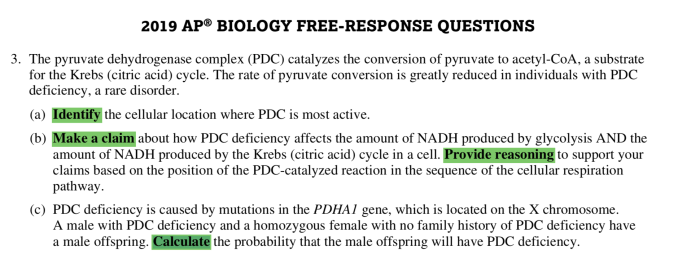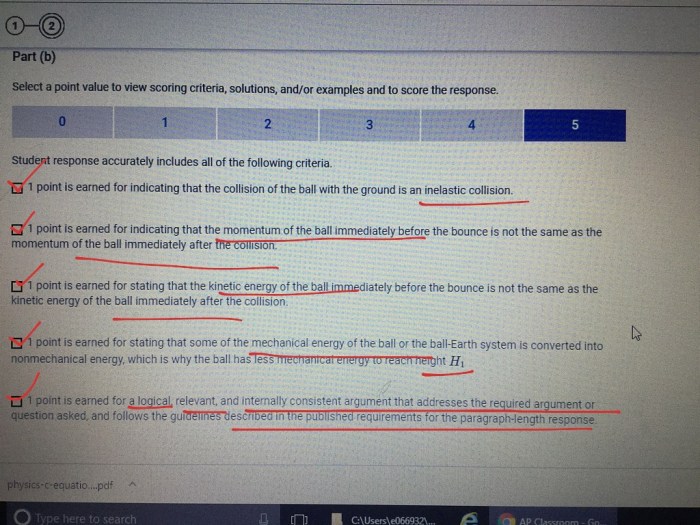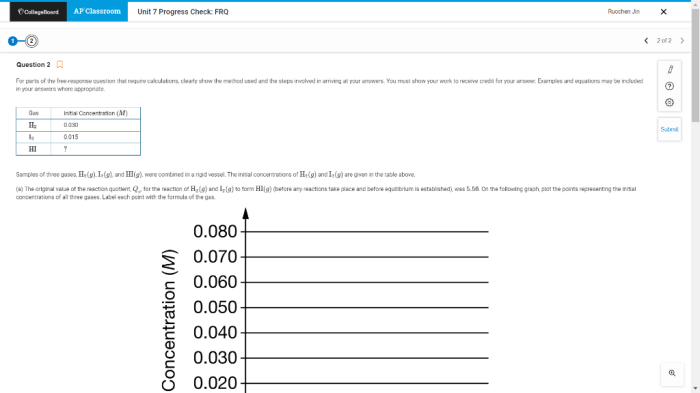Embark on a journey into the realm of Unit 9 Progress Check FRQ, an essential assessment tool designed to gauge your understanding and progress. This comprehensive guide will navigate you through the intricacies of the FRQ, empowering you with strategies, tips, and insights to excel in this academic endeavor.
As you delve into the depths of this guide, you will discover the historical significance of the FRQ, its evolving structure and content, and its profound impact on your learning journey. We will explore effective preparation techniques, unravel the scoring and evaluation process, and uncover the multifaceted applications of FRQs in shaping your educational experience.
Historical Context

The Unit 9 Progress Check FRQ is a significant assessment in the field of education. It has a rich history that spans several decades and has undergone various evolutions over time. The FRQ has played a crucial role in assessing student learning and shaping educational practices.
Evolution of the FRQ
The FRQ has evolved over the years to meet the changing needs of education. Initially, the FRQ was a paper-based assessment that required students to write extended responses to open-ended questions. As technology advanced, the FRQ transitioned to a digital format, allowing for more interactive and engaging assessment methods.
The content of the FRQ has also evolved to reflect the changing curriculum and educational standards. The FRQ now covers a wider range of topics and requires students to demonstrate higher-order thinking skills, such as critical analysis and problem-solving.
The Unit 9 Progress Check FRQ is an important assessment that can help you gauge your understanding of the material. If you’re looking for additional practice, be sure to check out the NC Drivers Ed Final Exam . This comprehensive resource includes practice questions and answer keys that can help you identify areas where you need additional support.
Once you’ve reviewed the material, return to the Unit 9 Progress Check FRQ and give it your best shot!
Impact on Student Learning
The Unit 9 Progress Check FRQ has a significant impact on student learning. It provides students with an opportunity to demonstrate their understanding of the material and to practice applying their knowledge to real-world situations.
The FRQ also helps students to develop their critical thinking skills and their ability to communicate their ideas effectively. By requiring students to write extended responses, the FRQ encourages them to organize their thoughts and to present their arguments in a clear and concise manner.
Structure and Content

The Unit 9 Progress Check FRQ is a structured assessment that evaluates students’ understanding of key concepts and content areas covered in Unit 9.
The FRQ consists of multiple sections, each addressing specific content areas and assessing students’ comprehension, analysis, and synthesis skills.
FRQ Structure
The FRQ is divided into two parts: Part A and Part B.
- Part Atypically includes multiple-choice questions that test students’ recall of factual information and basic concepts.
- Part Bconsists of short-answer and essay questions that require students to demonstrate their understanding of more complex concepts, analyze data, and formulate arguments.
Content Areas
The FRQ covers a range of content areas from Unit 9, including:
- Key Concepts:Students are assessed on their understanding of fundamental concepts such as the nature of science, scientific inquiry, and the scientific method.
- Scientific Processes:The FRQ evaluates students’ ability to design and conduct scientific investigations, analyze data, and draw conclusions.
- Science and Society:Students are tested on their understanding of the interactions between science, technology, and society.
Assessment of Understanding
The FRQ assesses students’ understanding of these content areas through a variety of question types.
- Multiple-choice questionstest students’ ability to identify the correct answer from a set of options.
- Short-answer questionsrequire students to provide concise, factual answers.
- Essay questionschallenge students to demonstrate their understanding of complex concepts, analyze data, and formulate arguments.
Student Preparation
To ace the Unit 9 Progress Check FRQ, preparation is key. Here are some insider tips and strategies to help you conquer this challenge:
Exam Preparation Strategies
1. -*Master the Course Material: Begin by thoroughly reviewing your notes, textbooks, and any other course materials. Focus on understanding the key concepts, historical events, and literary works covered in Unit 9.
2. -*Practice Question Types: Familiarize yourself with the different types of FRQ questions you may encounter. Practice answering questions that require you to analyze historical documents, interpret literature, or synthesize information from multiple sources.
3. -*Time Management: Time is of the essence during the exam. Practice answering questions within the allotted time frame. Learn to allocate your time wisely and prioritize the most important points.
4. -*Practice Writing: FRQs require you to write clear, concise, and well-supported responses. Practice writing essays and responses that demonstrate your understanding and analysis of the topic.
Importance of Practice and Review
Remember, practice makes perfect. The more you practice answering FRQs, the more confident and prepared you will be on exam day. Regularly review your practice responses to identify areas for improvement and strengthen your understanding.
By following these preparation strategies, you can significantly increase your chances of success on the Unit 9 Progress Check FRQ.
Scoring and Evaluation: Unit 9 Progress Check Frq

The Unit 9 Progress Check FRQ is scored based on a holistic rubric that assesses the student’s ability to demonstrate their understanding of the unit’s content and skills. The rubric considers several criteria, including the accuracy and completeness of the student’s response, the quality of their analysis, and their ability to communicate their ideas clearly and effectively.
Criteria Used to Evaluate Student Responses
- Accuracy and Completeness:The student’s response should accurately and completely address the prompt, providing specific and relevant information to support their claims.
- Analysis:The student’s response should demonstrate a deep understanding of the unit’s content and skills, and should provide insightful analysis and interpretation of the information presented.
- Communication:The student’s response should be well-organized and clearly written, using precise language and avoiding errors in grammar and mechanics.
Examples of High-Scoring and Low-Scoring FRQ Responses
High-Scoring Response:
The student’s response is well-organized and clearly written, and provides a comprehensive analysis of the prompt. The student demonstrates a deep understanding of the unit’s content and skills, and provides specific and relevant examples to support their claims.
Low-Scoring Response:
The student’s response is poorly organized and difficult to follow, and does not provide a comprehensive analysis of the prompt. The student demonstrates a limited understanding of the unit’s content and skills, and provides only vague and general examples to support their claims.
5. Applications
The Unit 9 Progress Check FRQ serves as a valuable assessment tool to inform instructional decisions and provide insights into student learning. By analyzing student responses, teachers can identify areas where students excel and where they need additional support.
Identifying Student Strengths and Weaknesses
FRQ responses offer a comprehensive view of student understanding, allowing teachers to pinpoint specific areas of strength and weakness. Students who demonstrate a strong grasp of the content and can effectively apply their knowledge will score higher on the FRQ.
Conversely, students who struggle with certain concepts or skills will likely have lower scores, indicating areas where they need additional support.
Differentiation, Unit 9 progress check frq
FRQ results can be used to differentiate instruction, tailoring it to meet the individual needs of students. Students who excel on the FRQ may be ready for more challenging material, while those who struggle may benefit from additional support and remediation.
By differentiating instruction based on FRQ results, teachers can ensure that all students are appropriately challenged and supported.
Sample FRQ Questions

The following are sample FRQ questions for Unit 9 Progress Check. These questions cover a variety of topics and difficulty levels, and they are designed to assess students’ understanding of the unit’s content.
Answer keys or scoring rubrics for the sample questions are not provided here, as they may vary depending on the specific grading criteria used by the teacher.
Question Types
The FRQ questions in Unit 9 Progress Check may include the following types:
- Short answer questions
- Long answer questions
- Essay questions
Short answer questions typically require students to provide a brief answer to a specific question. Long answer questions require students to provide a more detailed answer that demonstrates their understanding of the topic. Essay questions require students to write a well-organized and well-supported essay on a given topic.
Difficulty Levels
The FRQ questions in Unit 9 Progress Check may vary in difficulty level. Some questions may be more straightforward and require students to recall basic information, while other questions may be more challenging and require students to apply their knowledge to new situations.
The difficulty level of a question will typically be indicated by the number of points it is worth. Questions worth more points are typically more difficult than questions worth fewer points.
Sample Questions
Here are some sample FRQ questions that may be included in Unit 9 Progress Check:
- Explain the difference between a hypothesis and a theory.
- Describe the steps involved in the scientific method.
- Discuss the role of evidence in science.
- Analyze the strengths and weaknesses of a particular scientific study.
- Write an essay on the importance of science in society.
These are just a few examples of the types of FRQ questions that may be included in Unit 9 Progress Check. The actual questions on the test may vary depending on the specific content of the unit and the teacher’s grading criteria.
Q&A
What is the purpose of the Unit 9 Progress Check FRQ?
The Unit 9 Progress Check FRQ is designed to assess your understanding of key concepts and content covered in Unit 9. It provides valuable insights into your strengths and weaknesses, helping you identify areas for improvement and track your academic progress.
How should I prepare for the Unit 9 Progress Check FRQ?
Effective preparation for the Unit 9 Progress Check FRQ involves reviewing course materials, practicing answering different types of FRQ questions, and seeking clarification from your teacher or peers when needed. Additionally, it is crucial to manage your time wisely during the assessment to ensure you complete all questions thoroughly.
How is the Unit 9 Progress Check FRQ scored?
The Unit 9 Progress Check FRQ is typically scored based on specific criteria, such as the accuracy and completeness of your responses, the clarity and organization of your writing, and your ability to demonstrate critical thinking and problem-solving skills.